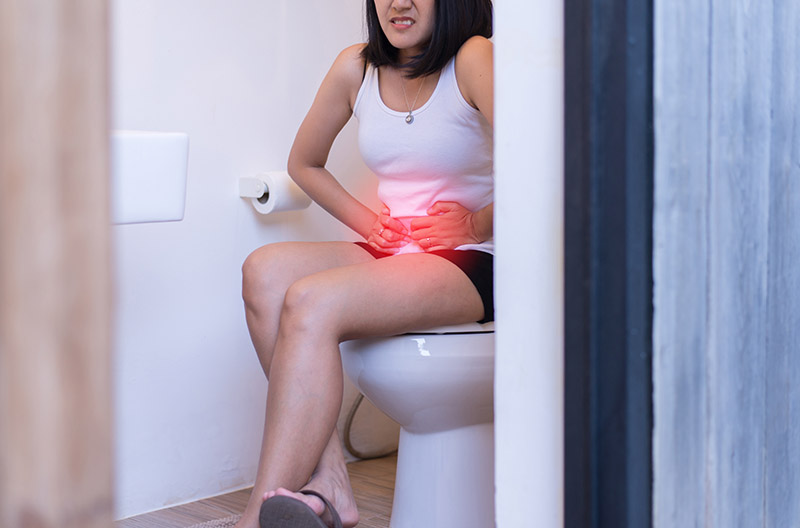Digestive Problems with Endometriosis – A Common Symptom
Digestive problems are prevalent among women with endometriosis, affecting up to 90%, according to some studies.
The good news is that only a small proportion of cases involve endometriosis directly affecting the bowel. In a study of endometriosis patients, only 7.9% of women with digestive symptoms were found to have endometriosis affecting the bowel.
However, many complaints are non-specific and may not be directly linked to the location of endometriosis. Despite this, it is crucial to investigate all possible causes thoroughly.
Digestive complaints associated with endometriosis can include:
- Flatulence
- Pain during bowel movement
- Blood in the stool
- Constipation
- Diarrhea
- Food allergies
- Nausea
Confusion with Gastrointestinal Disease Possible
In some women, the severity of digestive complaints leads the doctors to initially suspect a gastrointestinal disorder.
Surprisingly, despite these complaints, endometriosis is not always directly found in the intestine, and even more rarely, in the stomach.
Conversely, it is worth noting that other conditions like irritable bowel syndrome are more frequently observed in women with endometriosis.
Endometriosis Lesions on the Digestive Tract
Digestive complaints may not always directly indicate endometriosis on the digestive tract. However, it is essential to consider endometriosis lesions as the potential cause. When endometriosis lesions are present on the intestine, they can lead to various symptoms, such as pain, blood, and mucus during bowel movements, as well as diarrhea or constipation. It’s worth noting that some individuals may also be symptom-free despite having these lesions. Typically, these lesions are found in the rectum, while the small intestine and stomach are rarely affected. Additionally, endometriosis often grows around the rectum and in the area between the vagina and rectum, known as the spatium rectovaginale, leading to pain during sex in such cases.
An experienced examiner can identify endometriosis lesions on the digestive tract during a gynecologic exam with palpation of the vagina and bowel. Other diagnostic methods include ultrasound of the bowel wall, MRI, or laparoscopy.
Some women observe blood in the stool during their period, which could indicate endometriosis lesions in the bowel. These lesions develop and bleed off during the menstrual cycle, similar to the lining of the uterus. If blood is present in the stool, a colonoscopy is recommended to investigate other possible causes and assess for endometriosis. However, it is important to know that endometriosis on the bowel may not always be detected through colonoscopy, as it usually grows on the bowel from the outside.
Severe Pain During Defecation
Experiencing severe pain during or after defecation could potentially indicate the presence of endometriosis foci on or near the bowel, although it could also be unrelated. In cases of deep infiltrating endometriosis of the bowel, it is crucial to seek treatment and planning from an interdisciplinary endometriosis center.
However, it is important to note that most digestive complaints are highly nonspecific and do not directly point to endometriosis focus on the digestive tract. These symptoms can occur in endometriosis affecting other areas as well. As a result, the general gastrointestinal symptoms often lead to confusion with irritable bowel syndrome.
Another potential cause of problems can be adhesions resulting from endometriosis or surgery. Adhesions have the capacity to restrict the movement of the bowel, leading to disruptions in its transport function.
Women with Endometriosis: More likely to Experience Gastrointestinal Symptoms
Women with endometriosis are more likely to experience gastrointestinal symptoms compared to other women. These symptoms include constipation, nausea, flatulence, intolerance, and vomiting. Some may also suffer from an intense urge to defecate suddenly, leading to a need to rush to the bathroom. Additionally, some women report feeling unable to completely empty their bowels.
The precise causes of these symptoms are not always clear.
Some theories suggest a possible link between the bacterial intestinal flora and endometriosis, while others attribute the symptoms to inflammatory processes in the abdomen affecting the bowel. However, conclusive research findings have not yet provided a definitive answer.
What is certain is that these symptoms often occur in clusters and can significantly impact overall well-being.
Treatment of Endometriosis: Alleviating Gastrointestinal Problems
In many women, treatment of endometriosis can lead to an improvement in these gastrointestinal symptoms. However, it is essential for the doctor to rule out other potential causes.
The primary and crucial step for addressing digestive symptoms related to endometriosis is seeking specialized treatment from an endometriosis center. Additionally, in some cases, dietary changes may offer relief.
Stress can also negatively impact the intestines through the nervous system, making it essential to prioritize relaxation for supporting digestion. This implies that you have the power to positively influence your well-being by adjusting these factors.
Track your Gastrointestinal Symptoms
Take special note of your gastrointestinal symptoms and maintain a healthy diet. Try to understand when the symptoms occur and what factors influence them, such as diet, menstrual cycle, stress, or exercise.
However, it is crucial to visit an interdisciplinary endometriosis center, particularly if you experience such complaints! Here you can find relevant addresses in your area.
Use the Endo-App to track your bowel symptoms conveniently in a clear symptom diary. Download the Endo-App and gain valuable insights into typical and possible symptoms.
References
- Current Research on Endometriosis: An Interview with Deborah Bush - 6. February 2024
- Pain and Pain Management – Interview with Rehab Psychologist Teresa - 19. November 2023
- Physiotherapy for Endometriosis – Interview with Annika Cost – with Exercises - 19. November 2023

